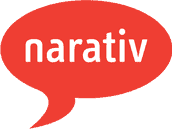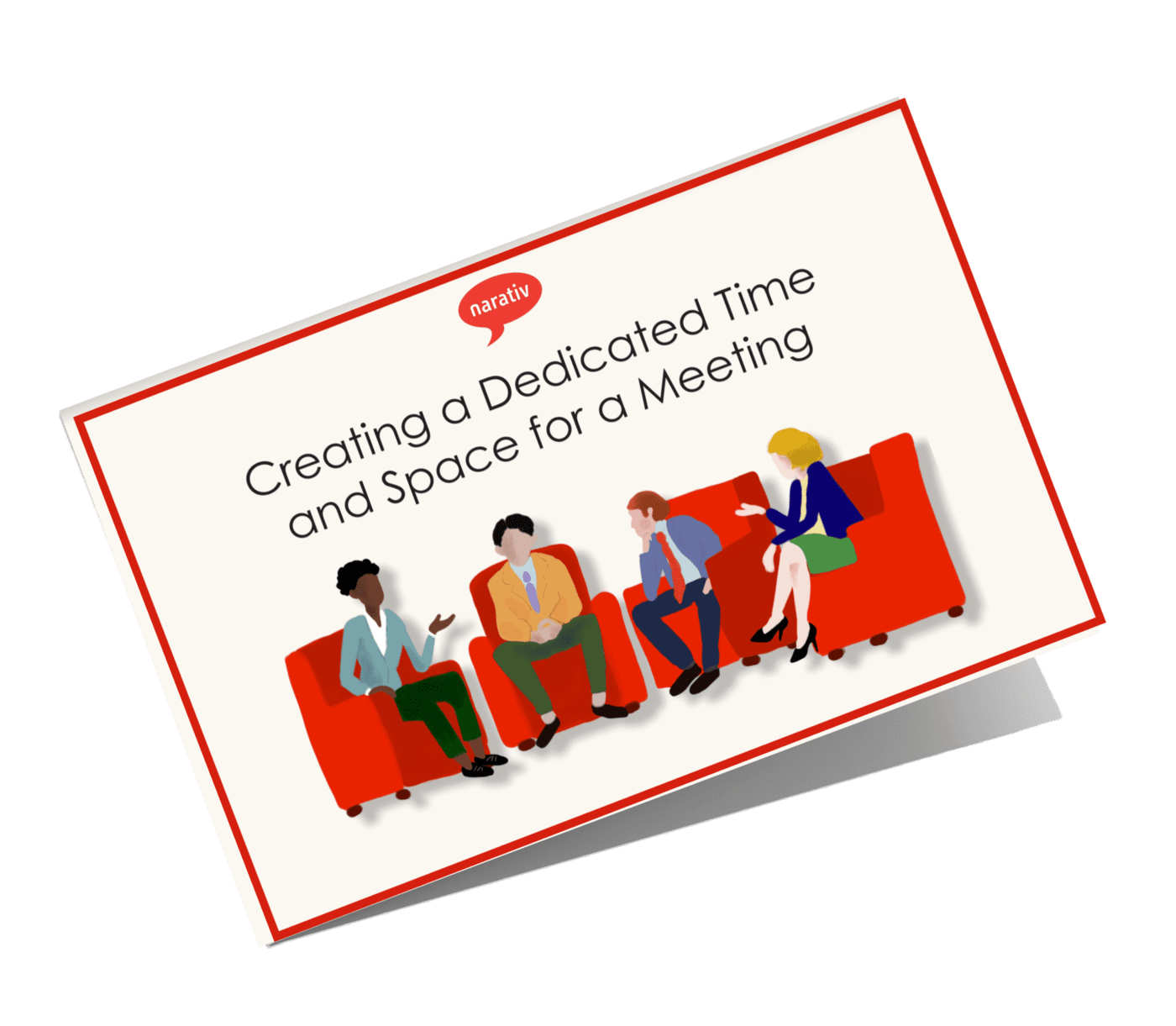Recently, we sat down with Narativ co-founder, Dr. Paul Browde. Paul is a physician, a psychiatrist, a couple’s therapist, and an overall “guide” for those with whom he is working. His philosophy is rooted in the power of listening and he cites that his deepest aspiration is to create a world in which people connect with one another; and through this connection, love their lives.

At its core, our conversation centered around human connection and how vital it is for leaders everywhere to help inspire that connection as they navigate the daily unknowns of this brave new world in which we are all living. While there is no singular how-to that we can provide, there are four overarching themes that we gleaned from Paul about how leaders can shift their approach to facilitate a more effective workplace.
1. Give Permission to Bring Your Whole Self to Work
In our current climate, it has become difficult to segment work life from home life. Our homes have, in many cases, become our workplaces. The pressure of “holding it together” on video conference calls only adds to the stresses that you may already be trying to conceal. Paul explained that being able to bring your whole self to work includes bringing your feelings.
“I’ve been working with a company in Australia and people are dealing with being physically disconnected from their families, because they weren’t allowed to travel across borders. And yet, there they were in meetings around marketing or productivity, and trying to put their feelings aside. One team member in particular hadn’t seen her husband in eight weeks and was having to take care of the kids, the household, etc., by herself because he couldn’t get home. Nobody in the workplace knew this about her because she was just holding it all together for the Zoom calls and then falling apart afterwards.”
The taboo and stigma around showing feelings was holding her back initially, but she eventually went to the CEO to discuss the idea of sharing her feelings with her co-workers on their next call.
“The woman was then able to ‘bring her whole self to work’ through expressing her feelings and sharing the story of what was happening with her. This brought on tremendous empathy from others and the real paradox was that by spending just a little time sharing her feelings, she was able to put down the burden of her unspoken reality, saving the company time, and ultimately increasing productivity.”
Taking a Proactive Approach
Instead of leaders waiting for an employee to come to them and ask permission, there is an opportunity to be proactive and create space for talking about feelings in the workplace. This can be achieved by simply setting aside 10-15 minutes each day to listen to your team, clearing out obstacles to listening and so dramatically impacting their productivity.
2. Create Space for Listening Across Divides
Let’s face it—we are all living in a divided, highly-charged, “us versus them” world at the moment. This can make listening to one another challenging—but not impossible.
“There’s such polarization in the world right now,” Paul remarked. “Politically, socially, regarding the pandemic, we are so polarized. It’s as if the unspoken subtext is, ‘If ‘those people didn’t have that opinion, then we would be okay.’ But the truth is, it’s not about that—it’s about us being able to know how it feels to be ourselves at this time while listening across divides. We don’t have to necessarily agree, but we do have to listen. This is challenging.”
When true listening occurs, something shifts. Paul shared a beautiful analogy to help explain the experience of really listening to each other.
“We are all foreign countries to one another. I cannot know your language because I don’t live inside your experience. We all really live in different worlds.The only way to bridge that divide is to “visit” one another’s worlds—I can visit your world and I can host you in mine.”
This takes practice and patience! In the workplace, it can be as simple as weaving it into the start of a weekly 1:1 meeting, or pairing with a co-worker in group meetings, where there is an agreed upon time period where both participants get an equal turn to be the speaker (or “host”) and the listener (or “visitor”).
Short-Term Pain for a Long-Term Gain
All too often, misunderstanding or disconnection isn’t addressed in the workplace until a situation has escalated to a crisis-level urgency. Sometimes this leads to getting HR involved, spending time and money to help resolve an issue that ultimately ends up resulting in employee resignation. If organizational leaders can be more proactive in facilitating regular practices that enhance employee listening, much of this can be avoided. Leaders must learn to welcome difficult conversations.
3. Acknowledge Our Communal Grief
Part of the experience of living in 2022 is the reality of communal grief on a global level, yet it is ignored largely, especially in the workplace.
“If you look around,” Paul observed, “you will see that we are all going through stages of grief, at our own pace and in our own ways.”
While some of us may have reached true acceptance, most of us are still bouncing around in the first four stages. Have you experienced any of these? Or, have you witnessed them in friends, loved ones, or co-workers?
The real tragedy, however, isn’t the grief; it’s the lack of acknowledging with each other that it’s happening.
The Key to Human Connection
By facing our communal grief, we can begin to have conversations about our belief systems. This helps break down walls between us and leads to understanding, compassion and ultimately, empathy. Leaders have an opportunity and a platform to pause and acknowledge that this grief is real. It won’t fix it or make it go away, but it does humanize our experience which leads to greater connection. Acknowledging our grief in this way, allows us to also acknowledge our hopes and dreams.
4. Embrace Uncertainty
The portrait of a classic leader is someone who has a clear vision, knows all of the answers and leads the charge towards success. Modern-day leadership, on the other hand, requires an approach that is almost the exact opposite.
“Over the past couple of years, there has been so much talk about ‘when we get back to normal,” Paul remarked. “I really believe that we all know that there is no such thing anymore. There is no going back. So, what is the new story? We don’t yet know, and leaders right now need to be willing to sit in that uncertainty, honestly letting people know that they don’t know. Doing this takes courage and vulnerability.”
Paul noted two actionable steps that leaders can take to help them embrace the unknown: gratitude and learning in the midst of chaos. His work with a woman who heads up a food rescue organization came to mind as an example of this. Her leadership exemplifies the power in asking questions instead of just making proclamations.
“She is the leader of an organization that feeds thousands of hungry people. She is deeply grateful for being able to make a difference in this way, and she is continually learning. This allows her to say ‘Okay, what can I do about it? What can we do about it? And let’s remind one another that the little difference each of us makes is something?’ That kind of leadership leaves people with a sense of agency, appreciating the difference they can make, even in the face of the bigger picture of the unknown.”
Building Trust and Loyalty
The question remains, can leaders sit in the discomfort of not knowing? That depends partially upon their willingness to listen more than they speak. Listening and creating space for other team members to share their ideas and thoughts allows them to feel ownership and drives trust and loyalty.
Tomorrow’s Unknowns Define Today’s Leaders
Leadership is no longer “here’s where we’re heading and here’s how we are going to get there.” The illusions of control and certainty have vanished and reappeared in the form of the unknown.
Today’s leaders have a responsibility to sit in their own discomfort of not having all the answers. Paul notes, “Leadership now is ‘let’s not know together. I’m happy to lead you in the not knowing.’”
The onus is on the leaders of today—and tomorrow—to lead boldly and differently than ever before. While we don’t know exactly what this looks like, it is made up in part by the ability to address feelings, to create time and space to listen, to acknowledge our communal grief and willingly embrace the unknown. The world is shifting and we have an opportunity to do the same.
“Leadership begins with the self,” Paul remarked. “How you live and lead your life is naturally the way you inspire others to lead theirs. If you lead your life with regret, worry, and judgment, that is the kind of leadership you will provide. However, if you lead your life with passion, vulnerability and purpose, that is what you will inspire in others. Leading your own life in positive and uplifting ways, takes practice and attention.”
To learn more about Dr. Paul Browde, you can visit his website. If you are interested in learning more about Narativ and our business storytelling training programs, one-on-one coaching, and virtual workshops, please contact us so we can discuss your organizational needs specifically.



